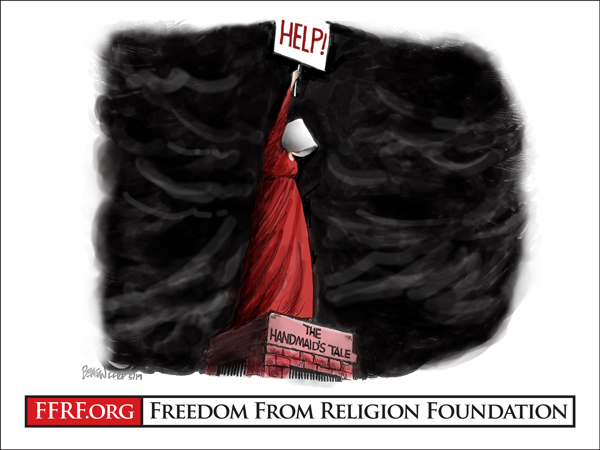
The highest court in the land today heard oral arguments in one of the most important reproductive rights cases of our time.
The U.S. Supreme Court this morning held oral arguments in Trump v. Pennsylvania, a case involving attacks on the contraceptive mandate by the Trump administration, “Little Sisters of the Poor” and others. The Freedom From Religion Foundation has signed on to a brief before the court contending that the Trump administration is breaching the First Amendment in allowing certain religion-based exemptions from required birth control coverage.
The court held remote arguments, which, for the first time in history, were livestreamed. The indomitable Justice Ruth Bader Ginsburg participated from her Maryland hospital bed after undergoing care for a gallstone infection.
“You are shifting the employer’s religious beliefs, the cost of them, onto these employees who do not share the religious beliefs,” she said. “The women here are getting nothing. They are required to do just what Congress didn’t want.”
The issue at question is whether employers with religious or so-called “moral” objections to contraception must abide by the contraceptive mandate under the Affordable Care Act, which requires employers to offer preventive care, including prescription contraception for women. After a religious outcry, the Obama administration since 2013 accommodated sectarian religious groups by exempting them from providing the coverage. All such religious institutions need only sign a waiver, and then their women employees receive contraceptive coverage from third-party insurers.
Under challenge is a 2017 rule adopted by the Trump administration expanding the right of employers to deny women workers birth control coverage. It said that groups, including companies and private universities with religious or moral qualms, could refuse contraceptive coverage. Additionally, religious and other groups would no longer need to give notice to the government that they sought a waiver accommodation, and female employers could be denied contraceptive coverage altogether.
President Trump announced this change at a Rose Garden event with much fanfare, saying: “We will not allow people of faith to be targeted, bullied or silenced anymore.”
Fortunately, a district court judge and a three-member panel of the 3rd U.S. Circuit Court of Appeals both ruled against the Trump administration’s proposed expansion. A Catholic order of nuns, the Little Sisters of the Poor Saint Peter and Paul Home, was permitted to intervene in the case and argue that the expansion was lawful. Little Sisters of the Poor is arguing that the mere act of signing the waiver violates their religious freedom and the Catholic view that birth control is a sin.
“At the heart of this case is that the Trump administration overreached and they violated the guarantee that women need to get the medicine Congress gave them,” Pennsylvania Attorney General Josh Shapiro said during the oral argument today. “Reproductive rights are on the line here. Guaranteed contraceptive coverage is on the line and so, too, is the rule of law.”
Shapiro and New Jersey Attorney General Gurbir Singh Grewal, who joined him during the oral arguments, maintain that the administration also violated the federal Administrative Procedures Act when it failed to advertise the proposed regulation and take public comment. Shapiro noted that before the mandate was adopted, one in three women struggled to afford birth control, and now that’s down to 4 percent. Shapiro said the rule would open the door to the “whims of any CEO,” who could use the denial to enforce the notion that women have no place in the workforce.
Among the defenders of the Trump Administration was the Alliance Defending Freedom, a notorious Christian Nationalist group representing the anti-abortion March for Life.
“When religion — instead of civil rights and the rule of law — holds sway in our government, watch out,” comments Annie Laurie Gaylor, FFRF co-president.

